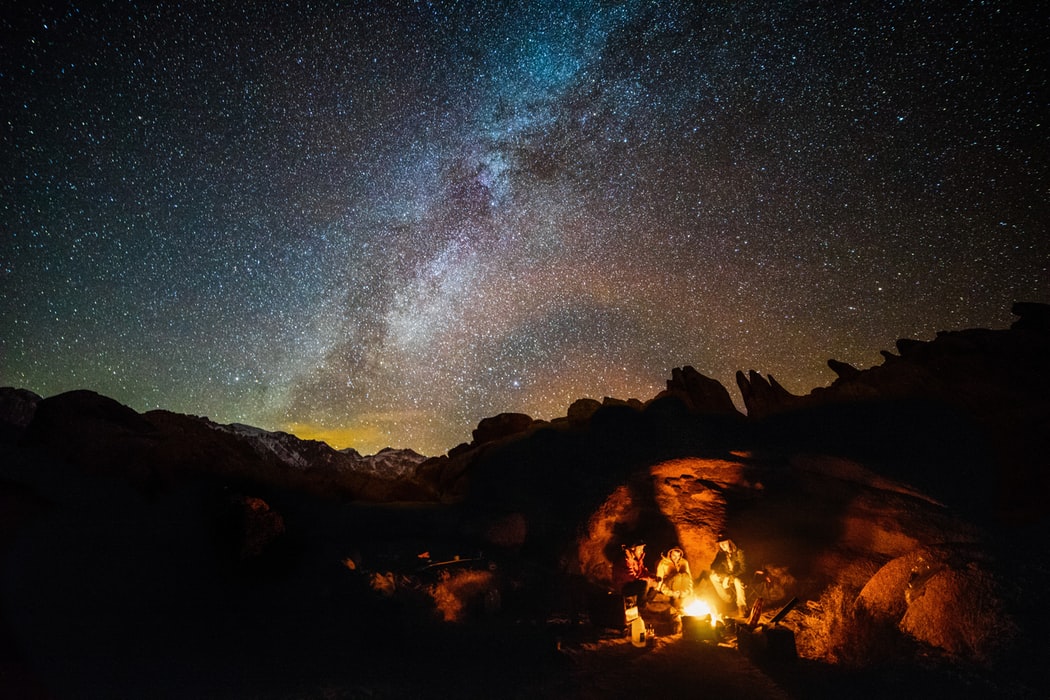The next time you think that someone’s constant texting with friends will lead to a lack of communication skills, a zombie-like dependence on technology, and the ultimate downfall of society, remember that over history the “group chat” has been an important part of human development and has been going on since humans first stood up on two feet.
In The Social Conquest of Earth, evolutionary biologist Edward O. Wilson writes the fascinating story of where humans came from, what shaped us into who we are today, and what social forces and developments led to the advancements in society and civilization that we currently enjoy.
Before there were group texts and party lines, there were campfires. The beginning of human social society tens of thousands of years ago began with our ability to create fire and control it. The first use of fire probably arose from lightning strikes. Many animals would be cooked by these fires which likely led to our human interest in cooking and eating meat.
After learning how to create fire and control it on our own, a small group of formerly nomadic scavengers could stay in one place for a longer time. This led to the development of campfires and campsites, which was likely the first step toward how our civilization evolved into the highly social and interdependent beehive that we live in today. Campfires and campsites became a type of nest that helped introduce the human species to a more social path of development.
The earliest campfires were a significant step towards group bonding within our species. They were common places to share food, tell stories, learn from each other, and begin to form strong bonds and loyalties within the group.
Once humans set up campsites, it became easier for division of labor to flourish. Some individuals would stay at the site to raise young or protect it from potential threats, while other group members would gather food, hunt for prey, and bring it back for the others.
Many animals are born, raised by parents for a short period of time, and then wander off to live their short lives and produce their own offspring. A human social society allowed the next generation to start its own families, stay with its groups. People could continue together across several generations. This social behavior led to a large leap towards a new human society, culture, and civilization.
Campfires and campsites served a valuable purpose for food, community, and defense, but they were also a part of evolution that led to the fulfillment of deeper psychological and spiritual needs as well. There were no books, recording devices or pen and paper. Stories and information that needed to be passed down to younger generations were shared at campfires. That included information and guidance that could one day save the lives of naïve young people. Stories told around campfires may have imparted practical knowledge about the nearby land, vegetation, enemies, and animals. Crucial knowledge was passed down between generations because it was important for survival.
Over the millennia, evolving humans used campfires as a place to tell stories, dance, and sing together as a community. Even today, an actual campfire is still a great place to share personal stories, sing songs and pass the time in fellowship.
Groups of humans with similar backgrounds, family ties and geographical proximity eventually banded together as tribes. Tribes are still an important part of society today and can be seen in the rooting for a sports team, a high school clique, a book club, or a hunting trip.
Wilson notes, “People must have a tribe. It gives them a name in addition to their own and social meaning in a chaotic world. It makes the environment less disorienting and dangerous. People savor the company of like-minded friends, and they yearn to be in one of the best tribes. To be part of a combat marine regiment, perhaps, an elite college, the executive committee of a company, a religious sect, a fraternity, a garden club, any collectivity that can be compared favorably with others.”
The social benefits of campfires evolved over time as technology evolved with the introduction of the written word, the printing press, newspapers, radio, television and the internet. Former President Franklin Delano Roosevelt knew the power of gathering people together around their new radio devices to deliver his fireside chats. Although the United States population was spread far and wide and coast to coast in the 1930s, Roosevelt was able to calm and soothe a nation weary from the Great Depression with his thirty such radio broadcasts between 1933 and 1944. Roosevelt spoke with familiarity to millions of Americans, telling them about new government policies, the Great Depression and his New Deal initiatives. While these chats were revolutionary at the time, they were merely a continuation of the timeless ideas of campfire gatherings, harnessed by the new technology of radio.
The common adoption of television into homes in the 1950s introduced a new form of gathering around the campfire to learns new stories, be entertained, and share a common bond. Presidential debates, Super Bowls and the first look at the Beatles were witnessed by a huge number of people and were discussed on a local level afterwards.
The invention of the internet continued the progress of the campfire. Millions of new users began to swap recipes, share pictures, create how-to videos and search for needed information. The primordial flame of disparate old fires was now a global blaze.
This led to the texting groups that we see today. Teens on the same cheerleading team, aging fraternity brothers in far-off locales, and carpool moms all form different group text tribes now, and the information they provide to each other and use can be as important as the tales told and entertainment shared by our distant ancestors around their campfires.
While group texting may seem like a novel and scary idea for those older than Generation Z, the exchange of information and entertainment is merely the age-old use of a campfire by a tribe, albeit in a much easier form of communication these days.



